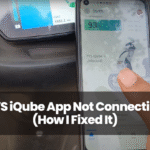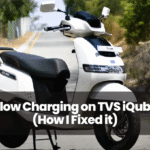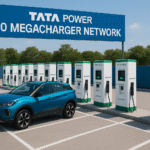In a clear-cut bureaucratic mistake, a Nagpur electric vehicle (EV) owner was wrongly fined ₹3,552 in road tax and penalties even though Maharashtra has exempted 100% road tax on EVs until March 31, 2025.
This mistake has brought to attention the gaps between policy and implementation at ground level, caused by RTO-level misunderstanding.
The Incident: Road Tax Notice for an Exempted EV Owner
Radhika Abhishek Kabra, the owner of an EV with registration number MH20FU1355, was left stunned by an SMS from the Nagpur Regional Transport Office (RTO) on April 15.
The SMS informed her that she had outstanding road tax dues between November 2021 and October 2025 and threatened action under Section 12(b) of the Maharashtra Motor Vehicles Tax Act, 1958.
Kabra was convinced by her dealer that all dues had been settled, but RTO officials insisted that she was still liable to pay. Eventually, she paid ₹2,400 as road tax and 1,152 for a penalty of ₹300 per year in those four years.

RTO Responds: “Bulk Messaging Error” Admitted
The error was accepted by some senior RTO officials, including Mr Kiran Bidkar of Nagpur. He said that the message was originally aimed at BH series vehicle owners, who pay biennial tax.
As an error, a third-party agency responsible for bulk messaging wrongly included EV owners unwittingly on its list.
“The messaging task was outsourced, and unfortunately, EV owners were wrongly included,” said Bidkar.
Policy Overview: Maharashtra’s EV Benefits
Maharashtra’s EV policy, launched in 2021, has tried to improve clean mobility by giving:
- 100% exemption from road tax and registration fees until 2025 for EVs
- Up to ₹1 lakh subsidy, which can be used when purchasing four-wheelers
- Get a subsidy of ₹10,000 if you want to buy an electric two- or three-wheeler.
- Extra incentives for early adopters and fleet buyers
Also, the state lifted a threatened 6% duty on EVs costing more than ₹30 lakh to ensure that they are affordable and widely accepted.

Bigger Picture: Consumer Trust at Stake
This incident exposes how even well-intentioned policies can go off course with bad administration. This showed that if India wants to achieve up to 30% EV penetration by 2030, such slip-ups in Governmental procedures may break the public’s confidence.
Industry figures, including SMEV, have called on the Indian government for a unified national online database linked to records and a training regime that raises the competence of those RTO staff.
The take-up of electric vehicles in the country is mainly an issue of public perception. If the first buyers buying an EV meet with chaos, fines, or long waits in offices, then naturally,, new customers are discouraged.
The government must guarantee a smoother and more rational user experience, especially for those private customers who need state help and a clear legal environment to embrace green energy. Consistency across states and throughout different regions is also important for EVs to flourish in the country.







